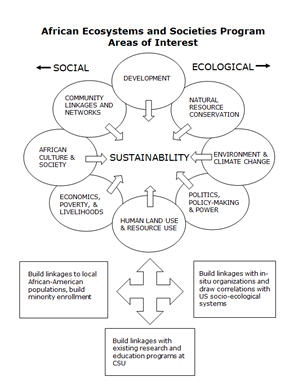The African Ecosystems and Societies Program (AESoP)
Mission
To improve understanding and conservation of biodiversity, ecosystem services, and human well-being on the African continent through state of the art interdisciplinary and transdisciplinary ecosystem and social science research, to develop solutions to environmental problems in places where people are integral components of the landscape, and to manage risk and increase social-ecological adaptability by performing demand-driven and problem-based research.
Rationale
Africa harbors enormous biodiversity and provides ecosystem services of world-wide significance, but these natural resources are in peril. Threats to African environments include: habitat loss and fragmentation, deforestation, overgrazing, unmanaged fire, bush encroachment, hydrological diversions, climate change, human population growth, human and animal diseases, invasive species, wildlife poaching, increased cultivation of marginal lands, air pollution, and water pollution. Threats to social systems include including land tenure and land rights issues (governance), fragile and changing ecosystems, political instability, drought and other ecological shocks, land grabbing, variable infrastructure and market access, human and livestock disease, and limited health and education resources. Ecological and human-ecological systems are increasingly vulnerable. African ecosystems face not only degradation, but collapse. Such tragic changes can occur suddenly, and may be difficult or impossible to reverse.
Primary Goals
Improve our understanding of ecological and social issues facing Africa and their interconnections, and enhance the knowledge base that informs decision-makers at all levels (from family and village to national and regional), identifying the implications of land-use policies and decisions that affect long-term sustainability and integrity of African ecosystems.
- Use the best environmental science to enhance decisions and policies that influence social-ecological sustainability in Africa.
Primary Products
- Higher Education partnerships to develop research and education in the drylands of Africa, in the classroom, online, and in the field.
- Integrated environmental assessments and corresponding strategies for solutions to environmental problems in Africa. Integrated assessments are interdisciplinary studies of ecosystems or human ecosystems that reveal how interactions among system components lead to emergent outcomes.
- Training of scientists and managers in the U.S. and Africa to build capacity for integrated research and assessments that provide viable solutions to African environmental problems.
AESoP Faculty
Randall Boone
Gillian Bowser
Michael Coughenour
Paul Evangelista
Kathleen Galvin
Melinda Laituri
Stacy Lynn
William Parton
Keith Paustian
Diana Wall
Robert Woodmansee
Current AESoP Students
Sarah Maisonneuve
Gloria Summay
Andrew Tredennick
Kate Wilkins
AESoP Alumni
Gabriela Bucini
Shauna Burnsilver
Eli Knapp
Linda Knapp
Stacy Lynn
Moffat Ngugi
Joana Roque de Pinho
William Sea
Jeff Worden
PARTNERS
- University of Nairobi, Nairobi, Kenya http://www.uonbi.ac.ke/
- Center for Sustainable Dryland Ecosystems and Societies, University of Nairobi, Nairobi, Kenya http://csdes.uonbi.ac.ke/
- Wondo Genet College of Forestry, Hawassa University, Ethiopia http://www.hu.edu.et/hu/index.php/78-hu/icetabs/201-wondo-genet-college-of-forestry-wgcf
- Reto-o-Reto Foundation, Kajiado, Kenya http://reto-o-reto.net/2010/02/10/welcome-to-the-reto-o-reto-project/
- International Livestock Research Institute, Nairobi, Kenya http://www.ilri.org/kenya
Downloads
- Download the full description of the African Ecosystems Program (pdf).
- Download the brochure for AESoP’s April 2012 Conference on Higher Education, Research and Sustainable Development in Africa (pdf).
- Download the Africa Program Points Schematic(pdf).